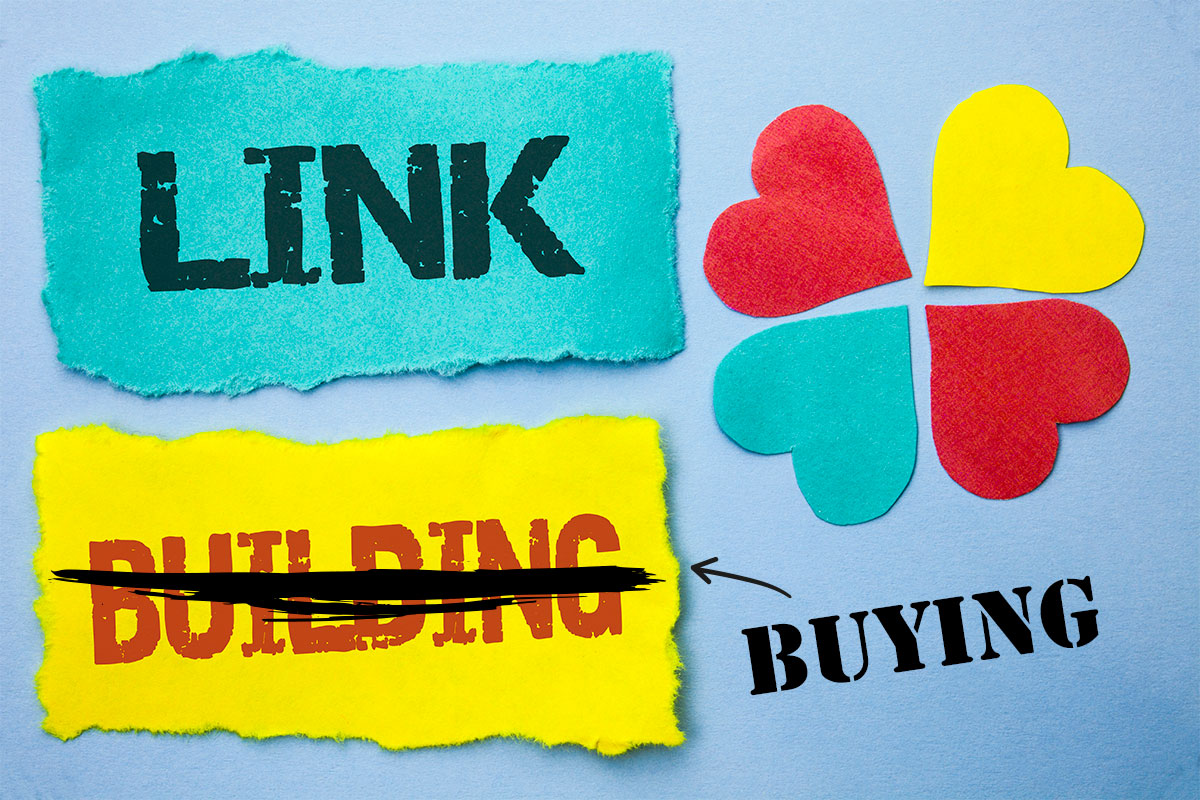As a longterm strategy, SEO can be more economical than many other marketing avenues, but it can also add up quickly if link aquisition is not performed with expertise and tact.
Building backlinks is critical to the success of any search engine optimization campaign.
David McSweeney, a frequent Ahrefs contributor, and Joshua Hardwick, Head of Content at Ahrefs and founder at The SEO Project, reported on the cost of buying links in 2018. They had some relatively decent numbers (data from 2018 and a benchmark from 2016) and some very insightful analysis.
Note: Ahrefs are the kings of backlink data but their are quite a few alternatives if you’re looking for other SEO specific functionality.
As an agency that provides blogger outreach services for our clients, we found his post incredibly valuable—we’ve used this data to benefit our client base in a variety of ways further.
From then on, we’ve made it a priority to monitor the market value of backlinks. However, we simply couldn’t leave all the heavy lifting to our friends David and Joshua; after all, they had already helped us so much! So, we decided to begin tracking our outreach communication and the results. The magic? We used the same variables as these SEO experts so that we could make a direct comparison and update this data!
So, from March 2018—November 2019, we repeated this study over a more extended period (about 22 months in total) with even more websites.
We also replicated all methodology to keep it a ‘controlled’ environment so that it was a direct comparison.
We asked the same three questions as the original study:
- Do these bloggers sell links?
- If so, how much do they charge for them?
- How many bloggers asked for payment?
Note: Just as the original study, we did not mention a fee or money at all in the emails. We also used the exact email template that was used in the previous study.
The strategically crafted email (thanks again, Joshua) ensured that we were clear and straightforward with our intent—we wanted to purchase a backlink from their website, and we also wanted to know what the cost would be. Here are our results.
What percentage of blogs were selling links in past year’s and what can we forecast for 2020?
For this study update, we contacted 3,900 sites across the same nine niches as the original study (approximately 430-450 sites in each).
Here are the nine niches:
- Fashion
- Finance
- Food
- Fitness
- Marketing
- Parenting
- Photography
- Travel
- Weddings
We used the same email as the original study, and we sent this same email out to every blogger. Below are both emails:
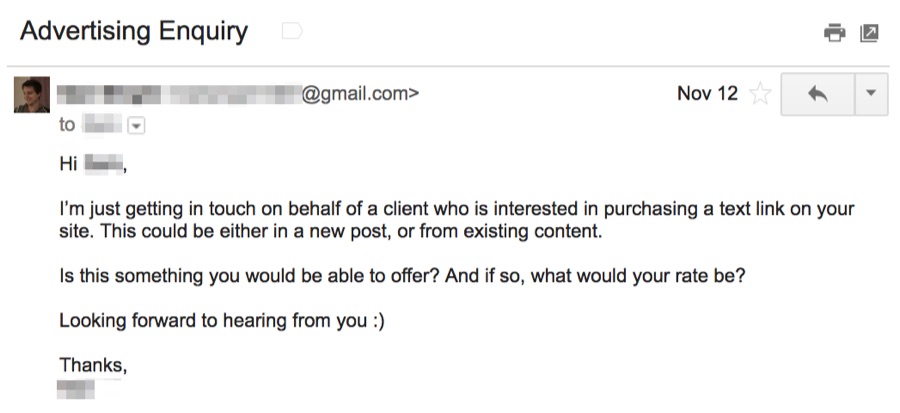
Here’s the email from the original 2018 study.
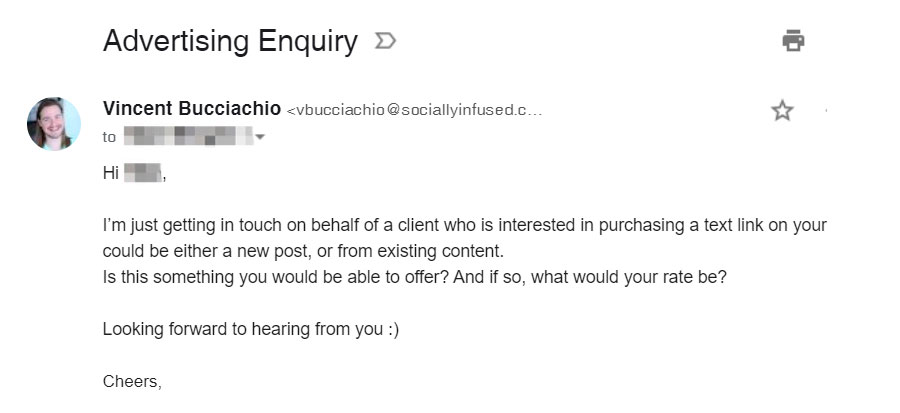
Here’s the email we used for the updated reachout.
The strategically crafted email (thanks again, Joshua) ensured that we were clear and straightforward with our intent—we wanted to purchase a backlink from their website, and we also wanted to know what the cost would be. Here are our results.
Total number of these blogs that were selling backlinks
Let’s first examine our totals:
- Sell links: 204
- Don’t sell links: 522
- No response: 3,058
- Bounces: 206
Here’s how these numbers compare to the studies of previous years:
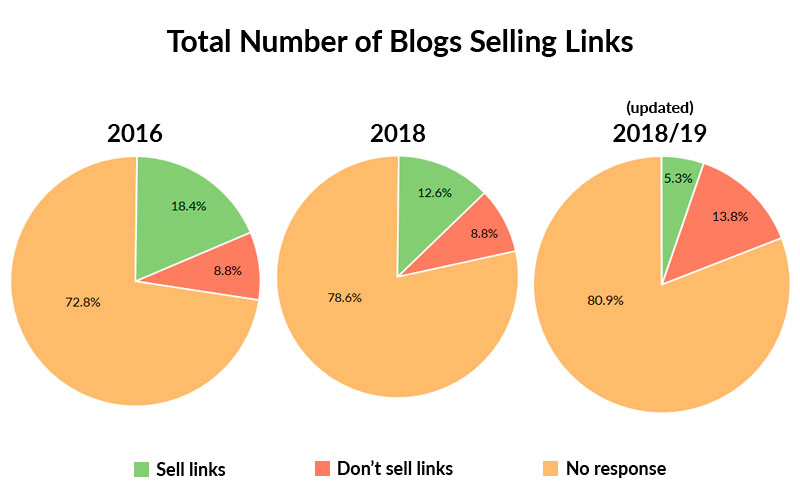
How different was the overall answer to what percentage of sites sell links? It’s very, very different, but let me give you a better view of things.
We can assume that those who responded with a ‘no’ or an ‘unfortunately we do not sell links from our site’ are hard ‘no’s’ AND we can also safely assume that the majority of contacts that did not respond are also not interested in selling links—now, there might be some outside factors to the non-responsive crowd, (for instance, they weren’t interested at the moment, they deleted our email without reading it, or it might have ended up in their junk) but we’re reasonably confident that ‘if you choose not to decide, you still have made a choice’. In this case, it’s a soft ‘no.’
With that Rush reference setting the baseline, we can then combine the hard no’s (Don’t sell links) and the soft no’s (No response) to calculate how many sites really don’t sell links and, conversely, how many do sell links.
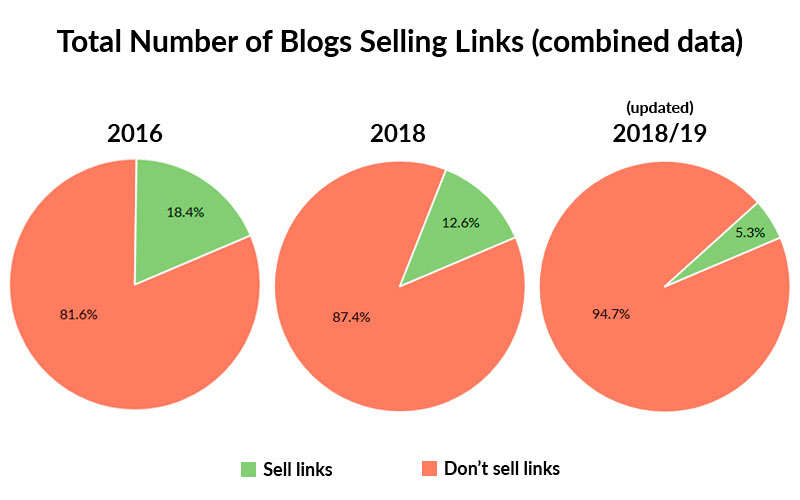
What we see is a pretty stark difference between the previous data and the updated data in the pie chart above. Only 5.1% of the bloggers we emailed decided to sell us a backlink, compared to 18.4% in 2016 and 12.6% in 2018, respectively.
Our rate seems to be more in line with what we were expecting to have seen over the past three years, (and we wish we had started this much earlier in the decade) but our general feeling is that the rates have declined (as the previous study suggests) and they may continue to do so in 2020.
However, the data continues to be mostly skewed towards the travel niche, and we will explore this aspect on the next chart.
Note: We will not share the sites that were part of this story or how we develop relationships for facilitating partnerships for our clients—it’s not essential, nor does it help with the learnings here.
Total Number of Blogs Selling Links by Niche
Here’s the list of the top niches with blogs that are selling links:
- Travel: 72
- Marketing: 42
- Parenting: 26
- Photography: 18
- Fitness: 16
- Food: 16
- Finance: 10
- Wedding: 4
- Fashion: 0
Once more, here’s the comparison to the previous studies:
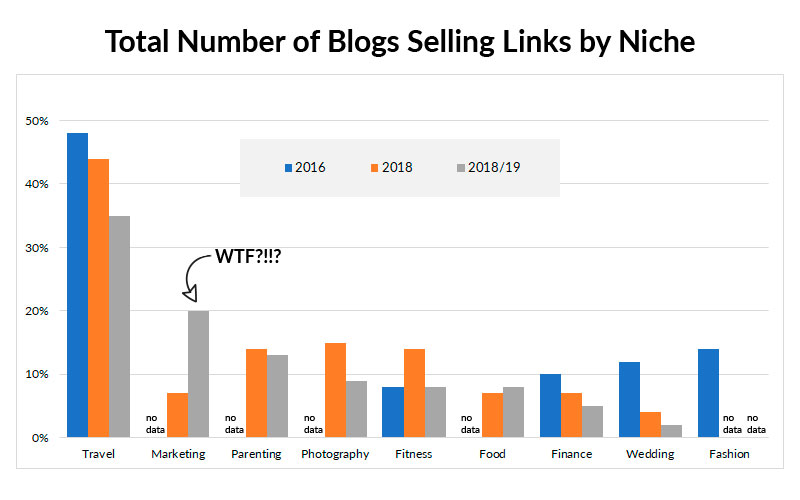
The travel niche was the most responsive niche to selling links at 35%, but this number did decrease from the earlier data. We are chalking this decrease up to normalization of the data, now that there are some more reliable sample sizes. As mentioned in previous studies, this is perfectly logical once we consider the competitiveness and value of the travel industry.
But the shocker here lies in marketing blogs, look at the change—it increased from 7% to 20%!
The marketing blogs are the gem of this updated study, and we will cement the niche’s value further as we dive deeper into our data.
Note: 34 of the websites specified that the links would be of “nofollow” status.
Next, let’s analyze the real cost of buying these links.
What is the forecasted price to purchase a website link in 2020?
There was no surprise here in the massive variance in the actual cost of buying the links.
Our lowest price was from a fitness blog that had a Domain Rating (DR) of 27, and the price was $20 for a link.
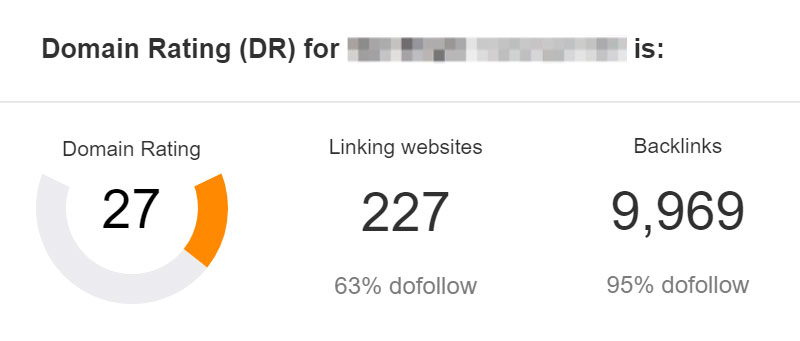
The highest price was $4,250 per year; this came from a travel blog with a DR of 72.
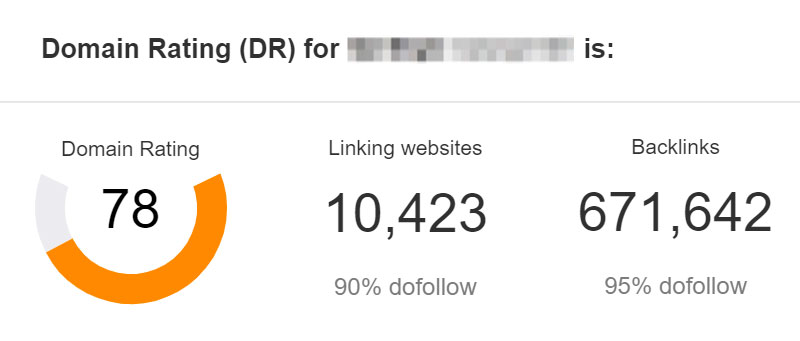
Across the 204 sites that were quoting us for backlinks, the average cost of buying a link was $291.55—that’s 19.3% ($-69.89) lower than the previous study, but don’t blow your top just yet as this number doesn’t tell the full story here.
Once again, the marketing blogs factor in hugely. Let’s dissect. If we remove the marketing niche entirely from the cost/link, the price increases to an enormous $391.55! Yes, you read that right. And that’s 7.6% ($30.11) higher than studies before. But why? Stay with us.
Mind blown! @sociallyinfused determines the average price of buying a backlink is $391.55 (study of 3,900 blogs) Click To TweetWho charges for guest posts, and what’s their price?
Let’s find out. We contacted 1350 blogs within the identical nine niches (approximately 150 per niche) with the same email as the previous study. Here’s the original email:
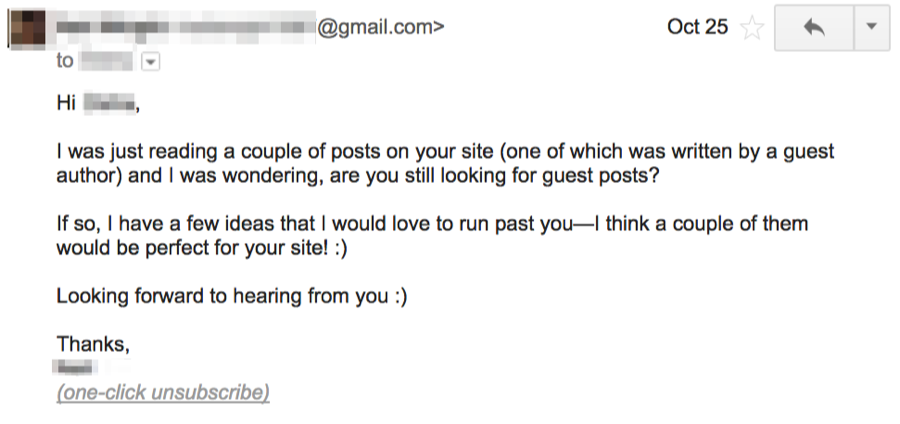
Courtesy of Ahrefs Pte Ltd.
We didn’t mention compensation or payment at all in the email.
Note: We only reached out to sites that indicated that they were looking for guest posts.
The number of blogs that were charging for guest postings
First, let’s take a look at the breakdown of these 1350 inquiries:
- Didn’t ask for money: 299
- Did ask for money: 160
- No response: 891
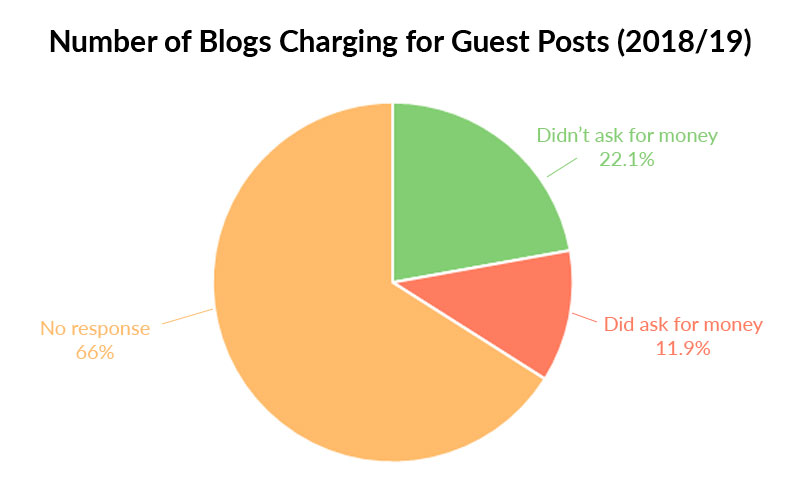
In the previous study, more than half (52%) of respondents requested payment but, in our update, only 35% asked. Amazingly, 1/5 of bloggers were happy to accept your guest post for absolutely nothing, not a dime!
What bloggers quoted us for guest posts by niche
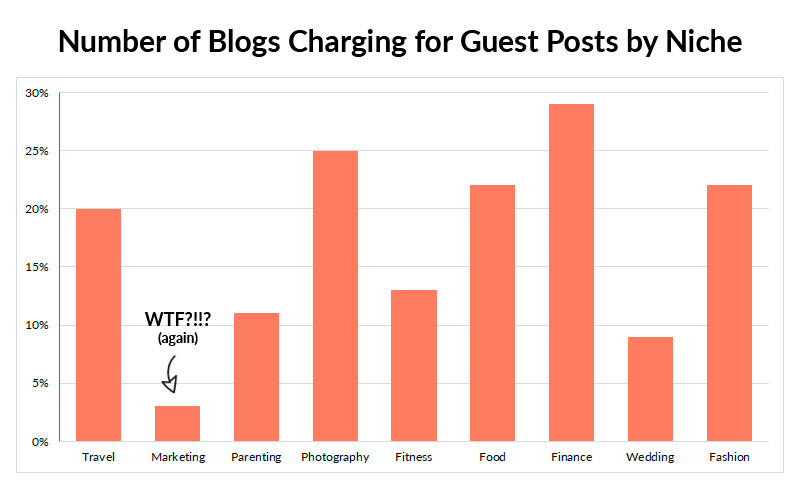
Nothing was shocking here. Some of the numbers changed slightly from the original study but, again, probably some normalization occurring with larger sample sizes. However, what this consistency in the findings did confirm is that marketing blogs remained the one outlier. Less than 5% of the entire marketing niche asked for any compensation for a guest post.
They recognize that it’s critical to remain within Google’s guidelines and that selling links does not comply—as emphasized by the legendary 2014 post from Matt Cutts.
So, what have we learned about buying links for 2020?
Link buying and selling will continue to remain a very active part of the SEO industry in 2020, and the cost is rising within most niche industries ($391.55), except for one rogue subset, marketing bloggers.
Our advice? Don’t buy links, create relationships. We feel that more industries will begin to get on board with the trend that the marketing niche is setting for 2020, and this will shift the landscape considerably—many more will be paying for excellent content authorship (rather than the link itself), and blogs with a high ranking authority will have the luxury of cherry-picking for the crème de la crème of web content.
Additional Notes:
We did not cover some of the data and finding from the original study because no real change occurred and there was nothing to report. For instance, ‘the average cost of a link still increases in line with DR’ and ‘buying links via guest posting vs. buying links via a direct’ yielded similar result to the initial study.
We don’t perform link buying, but we do facilitate partnerships that are mutually beneficial to our clients and those that we reach out to. If you are interested in buying links, make sure to use a ‘reasonably credible’ provider, like OutReachMama, The Hoth or FatJoe. Although we do not recommend, promote or encourage these services.
